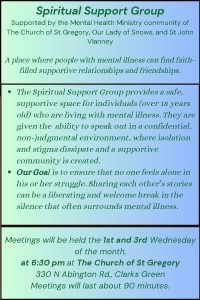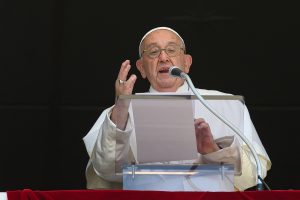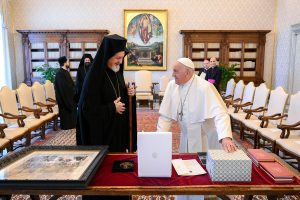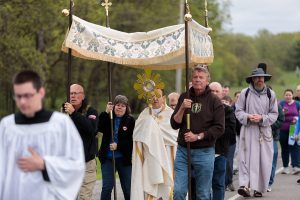WASHINGTON (OSV News) – Catholic Relief Services, the international relief and development agency of the Catholic Church in the U.S., criticized funding legislation recently passed by the U.S. House as “inconsistent with American values and interests” over cuts to humanitarian funding.
The legislation — the State, Foreign Operations, and Related Programs Appropriations Act, 2025 — which funds some of the U.S. priorities abroad, was approved by the House in a 212-200 vote June 28, and reflects Republicans’ pledge to cut funds for the overall legislation, representing about $7.6 billion less than the previous version.
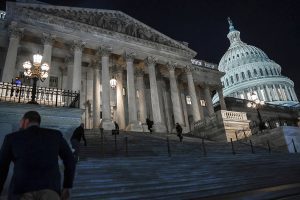
The House’s bill provides $3.3 billion in foreign military financing for Israel amid its conflict with Hamas, funds to counter China’s influence in the Indo-Pacific region and funds efforts to counter illegal crossings at the U.S.-Mexico border. But it also cuts some programs, including some environmental and humanitarian efforts.
Bill O’Keefe, executive vice president for Mission, Mobilization and Advocacy at CRS, said in a July 1 statement, “We were disappointed in the disproportionately low allocation provided to the State and Foreign Operations subcommittee for Fiscal Year 2025. We are further alarmed by the steep cuts to life-saving foreign assistance in the House-passed bill. The substantial reductions to critical humanitarian and development accounts, in some cases by roughly 25%, would have dire consequences for millions of families facing hunger, humanitarian crises and infectious diseases.”
O’Keefe further argued the bill “also fails to invest in climate adaptation, despite the moral, economic and security benefits of enhancing resilience to severe weather shocks like droughts, flooding and extreme heatwaves.”
“In our country and worldwide, these shocks have severely impacted self-sufficiency, food production and livelihoods for the most vulnerable communities around the world. These impacts are projected to worsen substantially over time,” O’Keefe said.
While CRS appreciates “the strong funding levels approved for a select few accounts such as nutrition and malaria,” O’Keefe said, “deprioritizing overall humanitarian and development funding is inconsistent with American values and interests.”
“The U.S. must get serious about combating global poverty by funding effective foreign assistance programs we know support people, families and communities to thrive,” O’Keefe said. “We will collaborate with Congress on a bipartisan bill that robustly funds humanitarian and development programming and provides a courageous response to the challenges facing our global family. The U.S. has long been a force for good around the world, and CRS is committed to supporting the passage of a bill that reflects that history.”
Rep. Mario Diaz-Balart, R-Fla., chairman of the State and Foreign Operations Subcommittee said in a statement, “I am very pleased with the House’s approval of the State and Foreign Operations bill for the Fiscal Year 2025 which builds on the policy wins of the Fiscal Year 2024 enacted bill.”
“This crucial piece of legislation, which funds our national security and foreign policy priorities, safeguards hard-earned American taxpayer dollars while upholding key U.S. values,” Diaz-Balart said June 28.
He cast the cuts as “among the many victories,” saying, “We achieved a 19% reduction from the President’s Budget, and an 11% cut from Fiscal Year 2024 enacted levels.”
“This legislation continues to reestablish American leadership where it has been severely lacking under the Biden Administration,” Diaz-Balart said. “It upholds key U.S. national security priorities by supporting allies such as Israel and Taiwan and countering adversaries such as Communist China, the terrorist states of Iran and Cuba, and terrorist organizations such as Hamas and Hezbollah.”
Under the leadership of the Appropriations Committee chairman, Rep. Tom Cole, R-Olka., “and with the support of my colleagues,” he argued, “we are cutting wasteful spending while fulfilling our national security commitments with the passage of the State and Foreign Operations funding bill for Fiscal Year 2025. This bill will advance global freedom, manifest strong solidarity with our allies, and stand firm against the malign forces undermining U.S. national security.”
Sen. Ben Cardin, D-Md., chair of the Senate Foreign Relations Committee, criticized the House’s legislation prior to its passage, saying in a June 18 statement, “In spite of an urgent need for U.S. diplomatic engagement and assistance in a volatile world, House Republicans are abandoning last year’s budget agreement and proposing to slash State Department and USAID budgets.”
“Their bill would drastically cut staffing and programming at our foreign affairs agencies — undermining our ability to deliver on our strategic foreign policy objectives, such as supporting our allies, competing with malign actors, and modernizing our foreign affairs workforce,” Cardin said.
In April, the U.S. bishops’ conference asked congressional lawmakers to protect peacebuilding and humanitarian aid in the bill.
Each year the U.S. Conference and Catholic Bishops and CRS “implore Congress,” the letter said, “to assess budget decisions using three criteria: protection of human life and dignity, impact on the most vulnerable, and advancement of the common good.”
It added that Pope Francis “highlighted these priorities” in a January letter “asking global leaders to “be mindful of the moral responsibility that each of us has in the fight against poverty, the attainment of an integral development for all our brothers and sisters, and the quest for a peaceful coexistence among peoples.”

 The 2024 Vacation Bible Camp at St. Patrick’s Church in Milford, PA was a spirit and joy-filled few days as over 30 children learned about their Catholic faith, while having a great deal of fun as well.
The 2024 Vacation Bible Camp at St. Patrick’s Church in Milford, PA was a spirit and joy-filled few days as over 30 children learned about their Catholic faith, while having a great deal of fun as well.